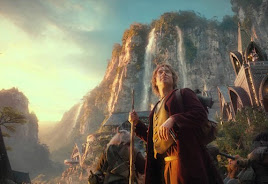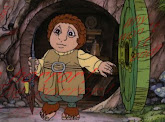And they introduce the Tauriel/Kili romance. I have mentioned elsewhere why I'm a fan--though I wish the movie had paid the romance off better (not necessarily happier, just better). I will discuss the trilogy's ending more later.
The Wood Elves are great characters in general: "less wise and more dangerous," as both Beorn (in the movie) and the narrator (in the text) state. The Elf King, Thranduil, played by Lee Pace, is a fantastic damaged leader.The conflict between him and Thorin is more direct in the movie than in the book but the dispute over gems is there plus the sense of long-held grievances and lifelong distrust: "Take him away...even if he waits a hundred years...I'm patient. I can wait."
In the book, Thorin and the other dwarfs are separated during their imprisonment. The others don't know what happened to Thorin, and Bilbo carries messages between him and the others. He also reconnoiters over several weeks and waits until the feast to free the dwarfs.
The movie speeds everything up.
Frankly, the Mirkwood sequence is one of the best in all the films with excellent pacing. It also has one of my favorite "nope, Martin Freeman doesn't need a voice over" scenes when Bilbo realizes he failed to get a barrel for himself.
Even the chase-chase-chase scene doesn't bother me. The dwarfs escape; the elves chase them; Azog and his people join in to get the dwarfs but end up inviting the elves' ire. The sequence is engaging, has a point, has mini-emotional arcs, and is actually fun to watch. It also brings several plots together, and there's no breakaway until the dwarfs get free. Then, the movie cuts to Gandalf.
Generally speaking, the action from Beorn through to the barrels is some of the best in the trilogy! The choices of what to keep and what to discard and what to speed up are very smart.
In sum, I think there are several reasons for the apparent seamlessness:
1. What happens next is naturally what would happen next, including Tauriel and Kili's conversations.
2. The characters' personalities--specifically Thranduil, Thorin, and Bilbo--are well-established enough to explain certain actions and reactions. Everyone behaves believably.
3. The main characters remain the center without feeling "showcased," so Bilbo's reaction to the ring in Mirkwood--a scene where he is separated again from the others--feels in pace with the rest rather than a breakaway.
4. The barrel-chase scene, again, highlights personality rather than being just a bunch of people getting felled by axes and falling into water. It even has some humor, as with Bombur's barrel act!
Consequently, The Desolation of Smaug, extended version, is the one DVD set of Jackson's movies I purchased for myself. I consider the piece fairly high quality as an actual movie.





























